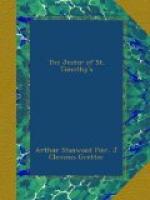After the first ten minutes St. Timothy’s made hardly an attempt to go round his end, but devoted their assaults to the centre and other wing of the line.
If there was one thing for which Collingwood, the best football player in the School, had achieved a special reputation, it was the fleetness and dexterity with which he could run the ball back after punts. He was known as the best man in the back field that St. Timothy’s had had in years. So when Ballard prepared for his first kick, the spectators looked on with composure.
It was a fine kick; the ball went spiraling high and far, but Collingwood was under it as it fell, and Dennison was in front of him to protect him.
Yet Lawrence, rushing down upon them, was too quick, too clever; Dennison’s attempt to block him off was only a glancing one that staggered him for the fraction of an instant; and the ball had no sooner struck in Collingwood’s arms than Lawrence launched himself and hurled the runner backwards.
“Whew! What a fierce tackle!” ejaculated a boy near Irving admiringly.
“I think Lou did well to hang on the ball,” responded his friend.
Irving heard; he went about greedily drinking in comments which that tackle had evoked. He found himself standing behind Westby and the other substitutes, who, wrapped in blankets, trailed up and down the field keeping pace with the progress of their team.
“No!” Briggs, one of the substitutes, was saying. “Was that Kiddy Upton’s brother? He’s a whirlwind, isn’t he?”
“Looked to me as if he was trying to lay Lou Collingwood out,” returned Westby sourly.
At once Irving’s cheeks flamed hot. He put out his hand and touched Westby’s shoulder; the boy turned, and then the blood rushed into his cheeks too.
“Was there anything wrong about that tackle, Westby?” Irving asked.
“It just seemed to me he threw him pretty hard.”
Irving spoke to the three or four other substitutes standing by.
“I don’t know much about football; was there anything wrong with that tackle—that it should be criticised?”
“It looked all right to me,” said Briggs.
“If there is any question about it, I shall want to talk to my brother—”
“Oh, it was all right,” Windom spoke up. “It was a good, clean, hard tackle—the right kind. Wes is always down on the enemy, aren’t you, Wes?”
Westby stood in sullen silence. The next play was started; St. Timothy’s gained five yards, and in the movement of the crowd Irving and Westby were separated.
For a few moments Irving’s thoughts were diverted from his brother, and his joyous excitement was overshadowed by regret. He felt less indignant with Westby than sorry for him; he knew that the boy had repented of his hasty and intemperate words. If he would only come up and acknowledge it—so that he might be forgiven!
Then Irving put Westby out of his mind. St. Timothy’s had kicked; Ballard had recovered the ball for Harvard on St. Timothy’s forty-yard line, and then Warren, the quarterback, had made a long pass straight into Lawrence’s hands; Lawrence started to run; then, just as Chase and Baldersnaith were bearing down for the tackle, he stopped and hurled the ball forward and across to Newell, the other Harvard end.




